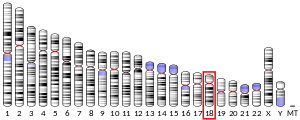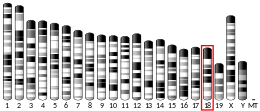Protein inhibitor of activated STAT2
Appearance
(Redirected from PIAS2)
E3 SUMO-protein ligase PIAS2 is an enzyme that in humans is encoded by the PIAS2 gene.[5][6][7]
Interactions
[edit]Protein inhibitor of activated STAT2 has been shown to interact with:
References
[edit]- ^ a b c GRCh38: Ensembl release 89: ENSG00000078043 – Ensembl, May 2017
- ^ a b c GRCm38: Ensembl release 89: ENSMUSG00000025423 – Ensembl, May 2017
- ^ "Human PubMed Reference:". National Center for Biotechnology Information, U.S. National Library of Medicine.
- ^ "Mouse PubMed Reference:". National Center for Biotechnology Information, U.S. National Library of Medicine.
- ^ Liu B, Liao J, Rao X, Kushner SA, Chung CD, Chang DD, Shuai K (September 1998). "Inhibition of Stat1-mediated gene activation by PIAS1". Proc Natl Acad Sci U S A. 95 (18): 10626–31. Bibcode:1998PNAS...9510626L. doi:10.1073/pnas.95.18.10626. PMC 27945. PMID 9724754.
- ^ Wu L, Wu H, Ma L, Sangiorgi F, Wu N, Bell JR, Lyons GE, Maxson R (September 1997). "Miz1, a novel zinc finger transcription factor that interacts with Msx2 and enhances its affinity for DNA". Mech Dev. 65 (1–2): 3–17. doi:10.1016/S0925-4773(97)00032-4. PMID 9256341. S2CID 11835268.
- ^ "Entrez Gene: PIAS2 protein inhibitor of activated STAT, 2".
- ^ Kotaja N, Aittomäki S, Silvennoinen O, Palvimo JJ, Jänne OA (December 2000). "ARIP3 (androgen receptor-interacting protein 3) and other PIAS (protein inhibitor of activated STAT) proteins differ in their ability to modulate steroid receptor-dependent transcriptional activation". Mol. Endocrinol. 14 (12): 1986–2000. doi:10.1210/mend.14.12.0569. PMID 11117529.
- ^ Moilanen AM, Karvonen U, Poukka H, Yan W, Toppari J, Jänne OA, Palvimo JJ (February 1999). "A testis-specific androgen receptor coregulator that belongs to a novel family of nuclear proteins". J. Biol. Chem. 274 (6): 3700–4. doi:10.1074/jbc.274.6.3700. PMID 9920921.
- ^ Ling Y, Sankpal UT, Robertson AK, McNally JG, Karpova T, Robertson KD (2004). "Modification of de novo DNA methyltransferase 3a (Dnmt3a) by SUMO-1 modulates its interaction with histone deacetylases (HDACs) and its capacity to repress transcription". Nucleic Acids Res. 32 (2): 598–610. doi:10.1093/nar/gkh195. PMC 373322. PMID 14752048.
- ^ Takahashi K, Taira T, Niki T, Seino C, Iguchi-Ariga SM, Ariga H (October 2001). "DJ-1 positively regulates the androgen receptor by impairing the binding of PIASx alpha to the receptor". J. Biol. Chem. 276 (40): 37556–63. doi:10.1074/jbc.M101730200. PMID 11477070.
- ^ Rual JF, Venkatesan K, Hao T, Hirozane-Kishikawa T, Dricot A, Li N, Berriz GF, Gibbons FD, Dreze M, Ayivi-Guedehoussou N, Klitgord N, Simon C, Boxem M, Milstein S, Rosenberg J, Goldberg DS, Zhang LV, Wong SL, Franklin G, Li S, Albala JS, Lim J, Fraughton C, Llamosas E, Cevik S, Bex C, Lamesch P, Sikorski RS, Vandenhaute J, Zoghbi HY, Smolyar A, Bosak S, Sequerra R, Doucette-Stamm L, Cusick ME, Hill DE, Roth FP, Vidal M (October 2005). "Towards a proteome-scale map of the human protein-protein interaction network". Nature. 437 (7062): 1173–8. Bibcode:2005Natur.437.1173R. doi:10.1038/nature04209. PMID 16189514. S2CID 4427026.
- ^ Lee BH, Yoshimatsu K, Maeda A, Ochiai K, Morimatsu M, Araki K, Ogino M, Morikawa S, Arikawa J (December 2003). "Association of the nucleocapsid protein of the Seoul and Hantaan hantaviruses with small ubiquitin-like modifier-1-related molecules". Virus Res. 98 (1): 83–91. doi:10.1016/j.virusres.2003.09.001. PMID 14609633.
Further reading
[edit]- Cookson MR (2003). "Pathways to Parkinsonism". Neuron. 37 (1): 7–10. doi:10.1016/S0896-6273(02)01166-2. PMID 12526767. S2CID 14513509.
- Moilanen AM, Karvonen U, Poukka H, Yan W, Toppari J, Jänne OA, Palvimo JJ (1999). "A testis-specific androgen receptor coregulator that belongs to a novel family of nuclear proteins". J. Biol. Chem. 274 (6): 3700–4. doi:10.1074/jbc.274.6.3700. PMID 9920921.
- Minty A, Dumont X, Kaghad M, Caput D (2000). "Covalent modification of p73alpha by SUMO-1. Two-hybrid screening with p73 identifies novel SUMO-1-interacting proteins and a SUMO-1 interaction motif". J. Biol. Chem. 275 (46): 36316–23. doi:10.1074/jbc.M004293200. PMID 10961991.
- Kotaja N, Aittomäki S, Silvennoinen O, Palvimo JJ, Jänne OA (2001). "ARIP3 (androgen receptor-interacting protein 3) and other PIAS (protein inhibitor of activated STAT) proteins differ in their ability to modulate steroid receptor-dependent transcriptional activation". Mol. Endocrinol. 14 (12): 1986–2000. doi:10.1210/mend.14.12.0569. PMID 11117529.
- Gross M, Liu B, Tan J, French FS, Carey M, Shuai K (2001). "Distinct effects of PIAS proteins on androgen-mediated gene activation in prostate cancer cells". Oncogene. 20 (29): 3880–7. doi:10.1038/sj.onc.1204489. PMID 11439351. S2CID 12895068.
- Takahashi K, Taira T, Niki T, Seino C, Iguchi-Ariga SM, Ariga H (2001). "DJ-1 positively regulates the androgen receptor by impairing the binding of PIASx alpha to the receptor". J. Biol. Chem. 276 (40): 37556–63. doi:10.1074/jbc.M101730200. PMID 11477070.
- Schmidt D, Müller S (2002). "Members of the PIAS family act as SUMO ligases for c-Jun and p53 and repress p53 activity". Proc. Natl. Acad. Sci. U.S.A. 99 (5): 2872–7. Bibcode:2002PNAS...99.2872S. doi:10.1073/pnas.052559499. PMC 122440. PMID 11867732.
- Tan JA, Hall SH, Hamil KG, Grossman G, Petrusz P, French FS (2002). "Protein inhibitors of activated STAT resemble scaffold attachment factors and function as interacting nuclear receptor coregulators". J. Biol. Chem. 277 (19): 16993–7001. doi:10.1074/jbc.M109217200. PMID 11877418.
- Nishida T, Yasuda H (2003). "PIAS1 and PIASxalpha function as SUMO-E3 ligases toward androgen receptor and repress androgen receptor-dependent transcription". J. Biol. Chem. 277 (44): 41311–7. doi:10.1074/jbc.M206741200. PMID 12177000.
- Tussie-Luna MI, Michel B, Hakre S, Roy AL (2003). "The SUMO ubiquitin-protein isopeptide ligase family member Miz1/PIASxbeta /Siz2 is a transcriptional cofactor for TFII-I". J. Biol. Chem. 277 (45): 43185–93. doi:10.1074/jbc.M207635200. PMID 12193603.
- Tussié-Luna MI, Bayarsaihan D, Seto E, Ruddle FH, Roy AL (2002). "Physical and functional interactions of histone deacetylase 3 with TFII-I family proteins and PIASxbeta". Proc. Natl. Acad. Sci. U.S.A. 99 (20): 12807–12. Bibcode:2002PNAS...9912807T. doi:10.1073/pnas.192464499. PMC 130541. PMID 12239342.
- Miyauchi Y, Yogosawa S, Honda R, Nishida T, Yasuda H (2003). "Sumoylation of Mdm2 by protein inhibitor of activated STAT (PIAS) and RanBP2 enzymes". J. Biol. Chem. 277 (51): 50131–6. doi:10.1074/jbc.M208319200. PMID 12393906.
- Arora T, Liu B, He H, Kim J, Murphy TL, Murphy KM, Modlin RL, Shuai K (2003). "PIASx is a transcriptional co-repressor of signal transducer and activator of transcription 4". J. Biol. Chem. 278 (24): 21327–30. doi:10.1074/jbc.C300119200. PMID 12716907.
- Ohshima T, Shimotohno K (2004). "Transforming growth factor-beta-mediated signaling via the p38 MAP kinase pathway activates Smad-dependent transcription through SUMO-1 modification of Smad4". J. Biol. Chem. 278 (51): 50833–42. doi:10.1074/jbc.M307533200. PMID 14514699.
- Lee BH, Yoshimatsu K, Maeda A, Ochiai K, Morimatsu M, Araki K, Ogino M, Morikawa S, Arikawa J (2004). "Association of the nucleocapsid protein of the Seoul and Hantaan hantaviruses with small ubiquitin-like modifier-1-related molecules". Virus Res. 98 (1): 83–91. doi:10.1016/j.virusres.2003.09.001. PMID 14609633.
- Lehner B, Semple JI, Brown SE, Counsell D, Campbell RD, Sanderson CM (2004). "Analysis of a high-throughput yeast two-hybrid system and its use to predict the function of intracellular proteins encoded within the human MHC class III region". Genomics. 83 (1): 153–67. doi:10.1016/S0888-7543(03)00235-0. PMID 14667819.







